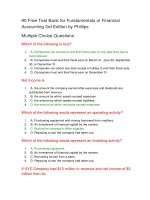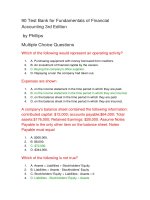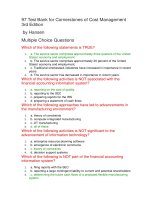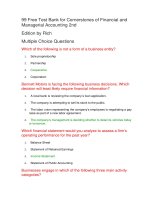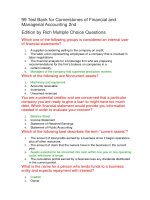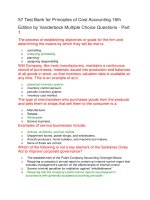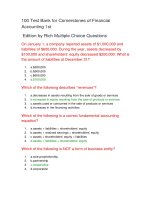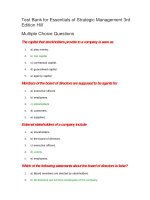97 test bank for cornerstones of cost management 3rd editio1
Bạn đang xem bản rút gọn của tài liệu. Xem và tải ngay bản đầy đủ của tài liệu tại đây (49.97 KB, 17 trang )
97 Test Bank for Cornerstones of Cost Management
3rd Edition
by Hansen
Multiple Choice Questions
Which of the following statements is TRUE?
1.
a. The service sector comprises approximately three quarters of the United
States' economy and employment.
2. b. The service sector comprises approximately 20 percent of the United
States' economy and employment.
3. c. Traditional smokestack industries have increased in importance in recent
years.
4. d. The service sector has decreased in importance in recent years.
Which of the following activities is NOT associated with the
financial accounting information system?
1.
2.
3.
4.
a. reporting on the cost of quality
b. reporting to the SEC
c. preparing reports for the IRS
d. preparing a statement of cash flows
Which of the following approaches have led to advancements in
the manufacturing environment?
1.
2.
3.
4.
a. theory of constraints
b. computer-integrated manufacturing
c. JIT manufacturing
d. all of these
Which of the following activities is NOT significant to the
advancement of information technology?
1.
2.
3.
4.
a. enterprise resource planning software
b. emergence of electronic commerce
c. theory of constraints
d. decision support systems
Which of the following is NOT part of the financial accounting
information system?
1.
2.
3.
a. filing reports with the SEC
b. reporting a large contingent liability to current and potential shareholders
c. determining the future cash flows of a proposed flexible manufacturing
system
4.
d. preparing GAAP financial statements
Which of the following cost management tools supports the firm's
concentration on the delivery of value to the customer?
1.
2.
3.
4.
a. service industry growth
b. global competition
c. preparing an earnings report for the SEC
d. value-chain analysis
Factors that have led to a global market for manufacturing and
service firms are
1.
2.
3.
4.
a. improved transportation and communications systems.
b. improved telemarketing and communications.
c. improved telemarketing and transportation systems.
d. None of these factors have contributed.
The type of management which broadens the focus of accounting
because it is concerned with factors that drive costs, such as
cycle time and process productivity is called:.
1.
2.
3.
4.
a. Cost accounting
b. Cost management
c. Financial management
d. Financial accounting
In an accounting information system, the inputs are usually
1.
2.
3.
4.
a. financial statements.
b. analyzing data.
c. performance reports.
d. economic events.
A computerized information system that strives to input data once
and make it available to people across the company for different
purposes is called a(n):
1.
2.
3.
4.
a. cost management information system
b. enterprise resource planning system
c. internal accounting system
d. financial accounting system
Which of the following costing activities is associated with the
financial accounting system?
1.
2.
3.
4.
a. determining the cost of a department
b. determining the cost of goods sold for financial statements
c. preparing budgets
d. determining the cost of a customer
In JIT manufacturing, each operation produces
1.
2.
3.
4.
a. only what is necessary for the succeeding operations.
b. all that it can to offset fixed costs.
c. a fixed percentage in excess of orders to ensure adequate quality stock.
d. all that it can in order to build inventories.
Cost management is the branch of accounting concerned with
reporting to
1.
2.
3.
4.
a. internal managers.
b. stockholders.
c. the government.
d. bankers.
Which of the following is NOT a process associated with an
accounting information system?
1.
2.
3.
4.
a. auditing existing data
b. collecting and recording data
c. providing information to users
d. analyzing and managing data
Financial accounting information is used for
1.
2.
3.
4.
a. investment decisions.
b. regulatory measures.
c. stewardship evaluation.
d. all of the above.
Which of the following is a cost management subsystem designed
to assign costs to individual products and services and other
objects, as specified by management
1.
2.
3.
4.
a. financial accounting information system
b. operational control system
c. cost accounting information system
d. all of the above
Which of the following activities is associated with the cost
management information system?
1.
2.
3.
4.
a. preparing reports for division managers
b. preparing reports for the IRS
c. preparing reports for the SEC
d. preparing financial statements that conform to GAAP
Which of the following activities is NOT associated with the cost
management information system?
1.
a. preparing a cost of quality report
2.
b. preparing a performance report that compares actual costs to budgeted
costs
3. c. determining the cost of a customer
4. d. using future expected earnings to estimate the price of a share of
common stock
Manufacturing environment automation is associated with
increases in
1.
2.
3.
4.
a. inventory.
b. productive capacity.
c. processing time.
d. none of these.
Which of the following is NOT provided by cost accountants?
1.
2.
3.
4.
a. cost information in accordance with GAAP
b. cost information about processes and activities
c. financial information for external users
d. cost information about products, customers, and services
Which of the following is NOT an advance in information
technology that affects firms?
1.
2.
3.
4.
a. computer integrated applications
b. GAAP reporting
c. emergence of electronic commerce
d. availability of tools such as OLAP and DSS
____is devoted to providing information for external users.
1.
2.
3.
4.
a. Management accounting
b. Financial accounting
c. Internal accounting
d. Cost accounting
The cost management information system is concerned with
1.
2.
a. reporting financial information according to GAAP.
b. providing cost information that is used in planning, control, and decisionmaking.
3. c. reporting to external users.
4. d. providing financial information to investors.
In an accounting information system, which of the following is
NOT a transformational process?
1.
2.
3.
4.
a. collecting data
b. analyzing data
c. performance reporting
d. summarizing data
Cost management reports are prepared
1.
2.
3.
a. to meet the needs of decision makers within the firm.
b. whenever stockholders request them.
c. according to guidelines prepared by the Securities and Exchange
Commission.
4. d. according to financial accounting standards.
Software that has integrated system capability using real time
data is
1.
2.
3.
4.
a. enterprise resource planning software.
b. on-line analytic programs.
c. computer-assisted engineering software.
d. none of these.
Any form of commerce that is executed using information and
communications technology is called:
1.
2.
3.
4.
a. ERP
b. OLAP
c. electronic commerce
d. DSS
Which of the following does NOT describe cost management
system?
1.
2.
3.
4.
a. evaluation of segments or products within the firm
b. emphasis on the future
c. externally focused
d. focus on effective use of resources
The increased importance of costing activities in the value chain
and determining the cost of different suppliers and customers has
led to the emergence of
1.
2.
3.
4.
a. OLAP.
b. EDI and supply chain management.
c. CAM.
d. theory of constraints.
The operational control system is concerned with
1.
2.
a. investment decisions.
b. what activities should be performed and assessing how well they are
performed.
3. c. consumption of productive resources by individual products.
4. d. none of these.
Cost accounting
1.
2.
a. is concerned with assigning costs to various cost objects.
b. attempts to satisfy the costing objectives of both financial accounting and
management accounting.
3. c. provides cost information that supports planning, controlling, and
decision making.
4. d. all of these.
The primary objective of the cost management information
system is to provide
1.
a. stockholders and potential investors with useful information for decision
making.
2. b. banks and other creditors with information useful in making credit
decisions.
3. c. management with information useful for planning and control of
operations.
4. d. the Internal Revenue Service with information about taxable income.
97 Free Test Bank for Cornerstones of Cost
Management 3rd Edition by Hansen Multiple Choice
Questions - Page 2
Monitoring the number of defects produced is an example of the
management function of
1.
2.
3.
4.
a. planning.
b. control.
c. decision making.
d. both a and c.
Accounting activities within an organization are usually under the
overall supervision of the
1.
2.
3.
4.
a. Certified Public Accountant.
b. controller.
c. Chartered Accountant.
d. treasurer.
Analyzing cost overruns to determine their cause is an example
of
1.
2.
3.
4.
a. planning.
b. control.
c. decision making.
d. both a and c.
Which of the following positions would most likely be a staff
manager?
1.
2.
3.
4.
a. manager of a Sears store
b. president
c. manager of a clothing division
d. controller
Which of the following job positions is a staff position?
1.
2.
3.
4.
a. controller
b. production vice president
c. production supervisor
d. assembly foreman
Which of the following job positions is a line function?
1.
2.
3.
4.
a. financial vice president
b. controller
c. production supervisor
d. treasurer
JIT is a critical part of a more comprehensive approach referred to
as:
1.
2.
3.
4.
a. supply chain management
b. lean manufacturing
c. just-in-time manufacturing
d. computer-integrated manufacturing
Which of the following would be considered a line function?
1.
2.
3.
4.
a. production
b. maintenance
c. public relations
d. administrative services
Currently, the activity found LEAST often within the controller's
department is
1.
2.
3.
4.
a. updating the general ledger.
b. budget preparation.
c. maintaining accounts receivable records.
d. establishing and maintaining a market for the organization's debt and
equity securities.
A person in a staff position
1.
2.
3.
4.
a. is directly involved in production.
b. provides support for the line function.
c. is not actually an employee of the company.
d. all of these.
Competitive advantage is established by providing
1.
2.
3.
4.
a. more customer products than competitors.
b. better quality than competitors.
c. greater customer value for less cost than competitors.
d. greater efficiencies than competitors.
Improvement in time performance is most likely NOT enhanced
by
1.
2.
3.
4.
a. redesign of products.
b. adding processes in production.
c. eliminating waste.
d. eliminating non-value-added activities.
Which of the following statements is NOT true about world-class
firms?
1.
2.
3.
a. World-class firms are firms that are poor in customer support.
b. World-class firms know their market and their products.
c. World-class firms strive continually to improve product design,
manufacture, and delivery.
4. d. World-class firms can compete with the best of the best in a global
environment.
Which of the following is the officer responsible for money
management and serves chiefly as the custodian of the
organization's funds?
1.
2.
3.
4.
a. Certified Public Accountant
b. controller
c. Chartered Accountant
d. treasurer
Which of the following is a staff position?
1.
2.
3.
4.
a. vice president of production
b. vice president of finance
c. vice president of marketing
d. plant foreman
Which of the following duties is usually assigned to the
controller?
1.
2.
3.
4.
a. receiving, maintaining custody of, and disbursing monies and securities
b. directing the granting of credit to clients
c. investing the organization's funds
d. tax planning
Cost management information systems further competitive
advantage by supporting three fundamental organizational goals.
Which of the following is NOT one of these fundamental
organizational goals that further competitive advantage?
1.
2.
3.
4.
a. improved time-based performance
b. improved quality of products and services
c. maximizing shareholder value
d. improved efficiency
The internal auditor performs a
1.
2.
3.
4.
a. line function.
b. staff function.
c. production function.
d. marketing function.
Which of the following are results of Lean Manufacturing?
1.
2.
3.
4.
a. elimination of waste
b. decreased lead time
c. costs decrease
d. all of the above
Performance reports are accounting reports that compare
1.
2.
3.
4.
a. planned data with actual data.
b. audited data with actual data.
c. managers' bonuses with performance ratings by supervisors.
d. planned data with industry standards.
The chief accounting officer of an organization is the
1.
2.
3.
4.
a. vice president of finance.
b. internal auditor.
c. treasurer.
d. controller.
All of the following would be considered staff functions EXCEPT
the
1.
2.
3.
4.
a. vice president of finance.
b. vice president of corporate planning.
c. vice president of marketing.
d. vice president of research and development.
Which of the following positions would most likely be a line
manager?
1.
2.
3.
4.
a. personnel department manager
b. production supervisor
c. treasurer
d. purchasing department manager
The setting of objectives and the identification of methods to
achieve those objectives is called
1.
2.
3.
4.
a. planning.
b. controlling.
c. performance evaluation.
d. decision making.
A critical measure of efficiency is
1.
2.
3.
4.
a. the cost of activity.
b. a T-test.
c. customer satisfaction.
d. employee job satisfaction.
Which of the following emerging trends in cost accounting deals
with managers striving to create an environment that will enable
workers to manufacture perfect (zero-defect) products?
1.
2.
3.
4.
a. advances in information technology
b. time as a competitive element
c. global competition
d. total quality management
Total quality management emphasizes
1.
2.
3.
4.
a. zero defects.
b. continual improvement.
c. elimination of waste.
d. all of these.
Comparing actual quality costs with planned quality costs is an
example of
1.
2.
3.
4.
a. planning.
b. controlling.
c. performance evaluation.
d. both b and c.
Which of the following activities is NOT associated with new
product development?
1.
2.
3.
4.
a. life-cycle costing
b. target costing
c. activity-based management
d. performance reports
Today's cost managers must assemble cost information and
determine how to value things. Which methods would NOT be
critical to achieving this?
1.
2.
3.
4.
a. foreign currency translation
b. costing and quality analysis
c. differentiating between value-added and non-value-added activities
d. measuring productivity
97 Free Test Bank for Cornerstones of Cost
Management 3rd Edition by Hansen Multiple Choice
Questions - Page 3
In a performance report, the
1.
a. differences between actual costs and allowed costs are always
undesirable.
2. b. expenditures of less than allowed amounts are undesirable.
3. c. expenditures of more than allowed amounts are not permitted to occur.
4. d. expenditures of less than allowed amounts are desirable.
In resolving an ethical conflict, which of the following would
NEVER be appropriate?
1.
2.
3.
4.
a. discussing the matter with the chief executive officer
b. discussing the matter with an external member of the board of directors
c. taking the matter to the press where there is no legal requirement
d. resigning from the position because of a conflict
Engaging in or supporting an activity that would discredit the
profession would relate to which part of the IMA Code of
Conduct?
1.
2.
3.
4.
a. competence
b. independence
c. integrity
d. credibility
In a company, engineers have redesigned production processes
lowering production costs, shortening production cycle time,
reducing waste and improving quality. Which type of managerial
activity applies to this situation?
1.
2.
3.
4.
a. controlling
b. continuous improvement
c. planning
d. decision making
Developing a company strategy for responding to anticipated new
markets is an example of
1.
2.
a. planning.
b. control.
3.
4.
c. performance evaluation.
d. all of these.
The IMA has a program to recognize professional competence
and educational attainment in the field of management
accounting. The program leads to designation as a
1.
2.
3.
4.
a. Certified Management Accountant.
b. controller.
c. Chartered Accountant.
d. treasurer.
An accountant certified to possess the minimal professional
qualifications for an external auditor is a
1.
2.
3.
4.
a. CPA
b. CMA
c. CIA
d. all of these
Extending the close of the fiscal year beyond December 31 so
that some sales of next year are included in the current year
would be a violation of which standard of ethical conduct for
management accountants?
1.
2.
3.
4.
a. competence
b. confidentiality
c. conformance
d. all of these
Which of the following have been found to be TRUE?
1.
a. Firms that emphasize ethics outperform firms that don't emphasize
ethics.
2. b. Those corporations that mention ethics in their management reports
have lower than average performance.
3. c. Companies with a strong code of ethics and sense of integrity and honor
will have trouble competing over the long run.
4. d. All of these.
The certification sponsored by the Institute of Management
Accountants that emphasizes economics, finance, management,
financial accounting and reporting, management reporting, and
decision analysis is the
1.
2.
3.
4.
a. CPA
b. CMA
c. CIA
d. all of these
Persons in the United States who provide external auditing
services are designated as
1.
2.
3.
4.
a. Certified Public Accountants.
b. Certified Financial Accountants.
c. Chartered Accountants.
d. Certified Management Accountants.
Managers are considering outsourcing sub-components of
production. Data is collected about the costs of making the subcomponent. Different bids are sought about the purchase of the
sub-components. Which managerial activity is applicable in this
situation?
1.
2.
3.
4.
a. control
b. continuous improvement
c. planning
d. decision making
The planning process includes
1.
2.
3.
4.
a. setting objectives.
b. identifying means of achieving the objectives.
c. making decisions.
d. all of these.
The standards of ethical conduct for management accountants
include
1.
2.
3.
4.
a. competence and performance.
b. integrity and respect for others.
c. confidentiality, confidence, integrity, and observance.
d. competence, confidentiality, integrity, and credibility.
Investigating production variances and adjusting the production
process is an example of
1.
2.
3.
4.
a. planning.
b. control.
c. internal auditing.
d. both a and c.
Which of the following describes the managerial activity of
comparing actual results with budgeted results?
1.
2.
3.
4.
a. control
b. continuous improvement
c. planning
d. decision making
Altering dates of shipping documents of next January's sales to
record them as sales in the current year would be a violation of
which standard of ethical conduct for management accountants?
1.
2.
3.
4.
a. competence
b. integrity
c. credibility
d. all of these
The manager has to decide what tasks are needed and how they
should be accomplished. This statement describes
1.
2.
3.
4.
a. the organization chart.
b. planning.
c. organizing.
d. none of these.
Disclosing all information, unfavorable as well as favorable, that
could influence an intended user’s understanding of reports,
would relate to what section of the IMA Code of Conduct?
1.
2.
3.
4.
a. competence
b. independence
c. integrity
d. credibility
Which of the following relates to the credibility section of the IMA
Code of Conduct?
1.
2.
3.
4.
a. Prepare clear and complete reports.
b. Communicate professional limitations.
c. Avoid actual or apparent conflicts of interest.
d. Communicate information fairly and objectively.
Principles of personal ethical behavior include
1.
2.
3.
4.
a. integrity.
b. respect for others.
c. fairness.
d. all of these.
Determining the bid your company should submit on a
construction contract is an example of
1.
2.
3.
4.
a. planning.
b. control.
c. decision making.
d. none of the above
Continuous improvement is
1.
2.
3.
a. critical in a dynamic environment.
b. important to finding and maintaining a competitive advantage.
c. an effort to find ways to increase overall efficiency, improve quality, and
reduce costs.
4. d. all of these.
The monitoring of a plan's implementation is called
1.
2.
3.
4.
a. planning.
b. controlling.
c. decision making.
d. budgeting.
Setting the company's profit targets for the upcoming year is an
example of the management function of
1.
2.
3.
4.
a. planning.
b. control.
c. variance analysis.
d. internal auditing.
Evaluating the performance of a segment of the company is an
example of
1.
2.
3.
4.
a. planning.
b. control.
c. internal auditing.
d. both a and c.
When a management accountant attends training seminars on
new FASB rules, which part of the IMA Code of Conduct is being
observed?
1.
2.
3.
4.
a. competence
b. confidentiality
c. integrity
d. credibility
Setting the selling price of a company's product is an example of
1.
2.
3.
4.
a. planning.
b. control.
c. decision making.
d. all of these.
When a management accountant ignores data in favor of
unsupported opinion, this action would speak most directly to
which part of the IMA Code of Conduct?
1.
2.
a. competence
b. confidentiality
3.
4.
c. independence
d. credibility
The acceptance of a savings bond from a supplier would be a
violation of which standard of ethical conduct for management
accountants?
1.
2.
3.
4.
a. confidentiality
b. integrity
c. reliability
d. none of these
Disclosing company information (when not legally obligated to do
so) would be a violation of which part of the IMA Code of
Conduct?
1.
2.
3.
4.
a. competence
b. confidentiality
c. independence
d. credibility
In resolving an ethical conflict, it is inappropriate to discuss the
problem with the immediate supervisor because of a violation of
which standard of ethical conduct for management accountants?
1.
2.
3.
4.
a. competence
b. confidentiality
c. credibility
d. This action is not in violation of the code of conduct.
Inspecting units produced to determine if they meet specifications
is an example of
1.
2.
3.
4.
a. planning.
b. control.
c. decision making.
d. both a and c.
The Standards of Ethical Professional Practice of the Institute of
Management Accountants addresses all of the following
EXCEPT
1.
2.
3.
4.
a. competence
b. confidentiality
c. strategic cost management
d. integrity
The formulation of a program for the accomplishment of a specific
purpose is referred to as
1.
2.
3.
4.
a. controlling.
b. motivating.
c. organizing.
d. planning.
